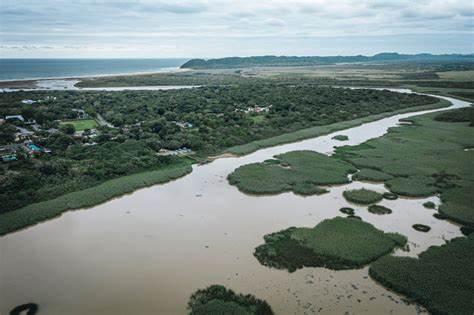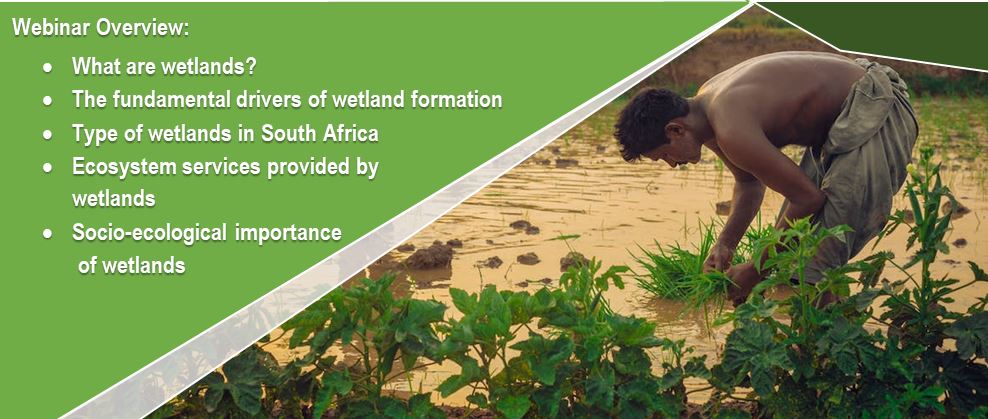Event Debrief: An overview of South African wetlands (GWD CENTRAL)
Event Debrief: An overview of South African wetlands (GWD CENTRAL)
07 Mar 2024

CPD EVENT DEBRIEF:
An overview of South African wetlands with a focus on their socio-ecological importance,
16 February 2024
Dr Paul Lourens (GWD Central Branch Chair) welcomed Steven Ellery, a wetland scientist working as an environmental consultant in KwaZulu Natal. He presented on wetlands in celebration of World Wetlands Day, welcoming the opportunity to illuminate the message that wetlands are vitally important to us, humans and our well-being.

View original event invite
MEETING SUMMARY ADJUSTED FROM OTTER IA, COURTESY OF LINDIWE NKABANE
Defining a wetland: In South Africa and in the National Water Act, we define wetlands as land, which is transitional between terrestrial and aquatic ecosystems where the water table is usually at or near the surface, this is important.
-
You get very small, temporary, temporarily wet wetlands like this small depression wetland, or
-
enormous wetlands that cover many, many square kilometers, so they come in many different shapes and sizes and occur in many different locations with the landscape
-
Wetlands incorporates both with aquatic environments where there is water above the land surface, and actually characterized more often by subsurface water so often again, the thought about wetlands is that there has to be water there all the time. But in some cases, they are either seasonally or temporarily waterlogged soils, and there isn't always surface water associated with wetlands.
Wetland ecosystems in Southern Africa.
-
During his Talk, Steven highlighted diversity of Southern African wetlands and their social & ecological importance:
-
Wetlands form in areas with specific landforms, geology, and hydrology that create conducive conditions for hydrophilic* vegetation.
* Essentially meaning vegetation that is not afraid of water
Wetland classification and ecosystem services.
-
Wetlands in South Africa are classified into six categories based on geomorphic position and hydrologic characteristics.
-
channeled valley bottoms, floodplains, depressions, wetlands, seep wetlands and wetland flats
-
-
Steven explained how water flows into wetlands through channelled inputs or flow from the catchment upstream, and then flows through the wetland in a diffuse and slow manner.
-
He provided an example of a seep wetland, where water is fed by groundwater or overland flow from the catchment, and then flows out of the wetland through infiltration or channelled outflow.
-
Wetlands form when specific conditions combine to create ideal conditions for water and plant life, providing ecosystem services worth trillions of dollars.
Wetland ecological state assessment.
-
Steven emphasized the interconnectedness of human and ecosystem systems and further explained that present ecological state assessments are necessary for wetland management and decision-making, as well as for legal requirements such as Ecological Reserve determinations and water use license applications.
-
Assessing present ecological state helps establish a baseline wetland health score, detect and monitor change over time, and inform development or management decisions.
-
Wetland health is assessed by measuring hydrology, geomorphology (i.e. land, and soil, sedimentation and landforms), vegetation, and water quality, with human impact considered.
Wetlands' ecological state and services.
-
Human activities like farming and forestry can harm wetland ecosystems by altering water quality, vegetation, and flow.
-
Wetlands provide flood attenuation, trap sediment, and store carbon.
-
Wetlands provide regulating and supporting services, including water purification, food production, and cultural benefits.
-
He explained that assessing the ecological state of wetlands by using a Supply and Demand Framework, with higher present state can lead to increased importance and service provision.
-
Lack of political will and capacity to enforce water-related legislation in South Africa hinders ecosystem management.
Environmental impact and decision-making.
Steven highlighted:
-
cumulative impact of individual actions on wetlands, advocates for rehabilitation and restoration efforts.
-
emphasized the importance of educating people for appreciation, not just awareness, to change behaviours and inform policy decisions.
-
emphasized importance of collaboration and self-reflection in environmental conservation.
EVENT RESOURCES
ADDITIONAL RESOURCES
- Webinars - SA Wetland Society
UPCOMING:
